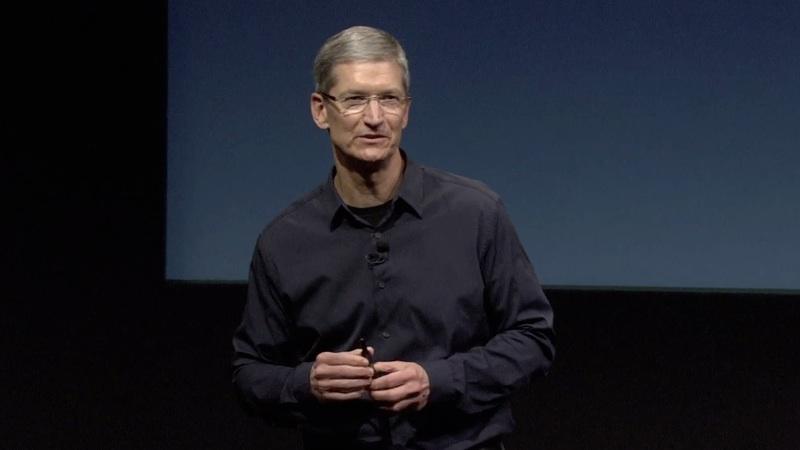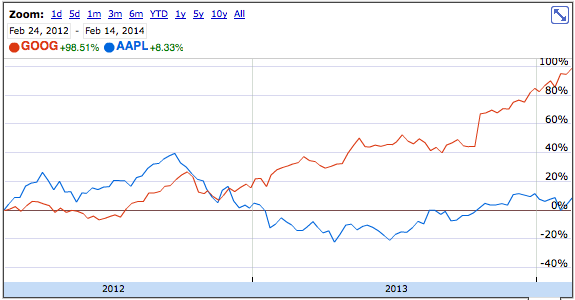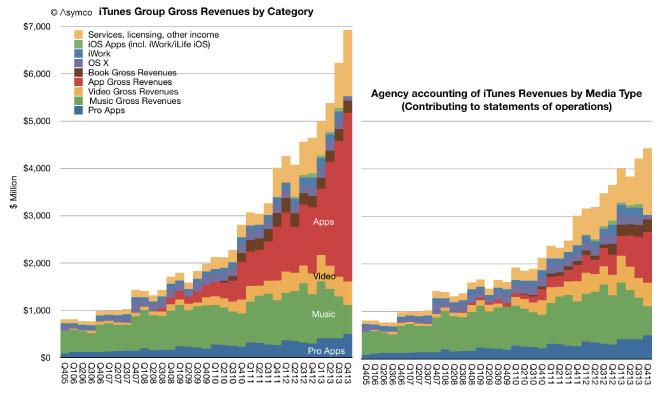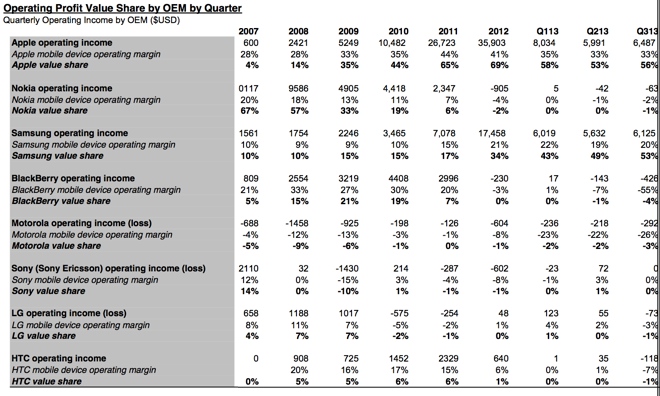Listening to the Google-enraptured tech media's echo chamber of fears, uncertainties and doubts about the world's most profitable and successful company, you'd never realize that there's an incredible bounty of low hanging fruit waiting for Tim Cook's Apple to harvest, and little but mobile scorched earth left behind Google.
Apple BCE: Before the Cook Era
It's almost hard to fathom that today's barely-old-enough-to-vote high school seniors were born in a year where anyone with a media badge was essentially required to refer to Apple, Inc. as not only "Apple Computer," but "the beleaguered Apple Computer," due to the fact that the Macintosh maker had been losing money while its software platform strategy continued to flounder.
In 1996, after a half decade of repeatedly starting, abandoning and then switching strategies for modernizing its Macintosh operating system, the company posted its first annual loss: $816 million for the fiscal year. That loss was accompanied by a restructuring that included a layoff of 1,300 employees.
In 1997, Apple's annual loss grew to $1 billion, although two thirds of that ($667 million) were directly connected to the costs of acquiring of Steve Jobs' NeXT and hardware maker Power Computing. Apple returned to profitability the next year, but it took many more years to lose the ubiquitous "beleaguered" tag.
Apple CE: 1998-2014
Today's teenagers have only seen a consistently successful, wildly profitable Apple. While there are now over 80,000 employees who all deserve some credit for Apple's current era of incredible success, it's easy to associate Apple's turnaround to the hiring of Tim Cook in 1998, the pivotal year when the company emerged from beleaguerment and began wowing the public with a disciplined, conservative selection of wildly innovative, attention arresting products.
From 2004 to 2007, Apple's annual gross profits increased 350 percent from $2.4 billion to $8.5 billion, then ballooned more than another 300 percent to reach $26.7 billion in 2010, and again made another leap of more than 260 percent to $71.1 billion for fiscal 2013 (not including the record winter quarter the media has labeled "disappointing" for not being higher than they could imagine on paper).
Other things the tech media have not been able to comprehend include how one company could exert dominating control over the profitable smartphone market with devices that sell into constrained supply while costing more than twice the Average Selling Price of its competitors, or how Apple could similarly dominate the profitable segment of PCs with Macs that cost four times more than the ASP of generic PCs ($1300 versus $301).
The massive Android delusion
Recall that these are the same journalists and pundits who maintained their press credentials through the first half of the 2000s while consistently predicting that cheap MP3 players (including feature phones) would ransack Apple's iPod business.
Rather than acknowledging their error, they have simply changed their predictions over the last decade to assume Apple's iPhone business would likely be eaten up by cheap smartphones powered by Symbian, then Linux, then Windows Mobile, then Android.
They are so fooled by their own propaganda that they seem to honestly believe that Android's 80 percent share of the world's phone shipments capable of running apps is impressive and unprecedented, as if the failed Sun Mobile Java and Adobe Flash Lite didn't similarly claim an identical dominating app platform share of shipping units prior to Google's brand emergence.
In fact, back in 2008, Strategy Analytics was tasked with producing reports about how widespread Flash Lite was as a mobile platform, and how rosy its future was. That data is no longer published by the company, which is now saying the same things about Android.
That same year I spoke at a conference in Malmö, Sweden, telling the mobile developer audience that Sun's then-widespread Mobile Java would face significant threat from Apple's new Cocoa Touch platform. At the time, there was much skepticism as Mobile Java then had an installed base comparable to Android's today.
The primary difference is that both Sun and Adobe earned some platform licensing revenue; Google does not. Google only earns thin mobile profits from advertising, but that's not unique to Android either; before Android became widely distributed, Google earned more lucrative mobile profits from iOS, something that Android's contention with Apple has only hurt as iOS has pulled away from Google's Maps and search services.
Blinding themselves (and their audiences) with a myopic fixation on simplistic percentage comparisons, the tech media has grown confident that Google's 3,890 percent gain in operating profits over the past decade is more impressive than Apple's growth of 13,350 percent.
Google, they like to point out, continued to grow over the past year, incrementing its operating income upward from $12.76 billion to $13.96 billion. Apple actually earned less in 2013 than it did in 2012, despite its revenues increasing by $14 billion (slightly more than Google's year over year revenue increase of $9.65 billion).
However, taking a step back to look at Apple under Cook since the passing of Steve Jobs in late 2011 (at the release of iPhone 4S), Apple's annual gross profits have jumped from $45.6 billion to $71.1 billion, and its operating income has leapt from $34.3 billion to a staggering $50.6 billion over the last two years. Apple's revenues have jumped from $108 billion during Jobs' last year to 2013's industry record shattering revenues of $171 billion.
Over the same two-year period, Google's gross profits have increased from $26.6 billion to $37.9 billion (growth of $11.3 billion compared to Apple's profit growth of $25.5 billion), while its operating income has grown from $11.7 billion to $13.97 (a hike of $2.3 billion versus Apple's $16.3 billion). Google's revenues are also up, from $37.9 billion to $59.3 billion (an increase of $21.4 billion, compared to Apple's revenue growth of $63 billion).
Despite those leaps, Apple's stock has only appreciated by $41, or about 8.3 percent over the past two years. Google's stock has nearly doubled, seeing an increase of 98.5 percent over the same two year period. It's hard to argue that's not delusion in a graph.
Disregarding the stock price and looking only at performance, it almost appears as if Jobs' passing has hurt Google more than it has affected Apple. Meanwhile, Apple has continued Jobs' legacy of producing meticulously designed premium hardware that the public clamors to pay a premium for even as Google has worked to perpetuate Microsoft's anti-Jobs, Windows/PlaysForSure strategy of broadly distributing software via low end hardware in an attempt to propagate a computing monoculture.
What about Mobile?
The vast expansion of capital accumulation (and therefore potential market power) during Cook's two year tenure as Apple's chief executive since Jobs' passing is tied directly to the massive surge of mobile computing, principally the iPhone but also the iPad, and to a smaller but very significant extent, the expansion of Apple's iTunes and App Store mobile ecosystem flourishing around iOS.
Google is certainly performing amazingly well as a company, but its fortunes are not tied to mobile performance. The vast majority of Google's revenues and profits come from ads connected to the conventional PC desktop.
While Apple owes nearly 90 percent of its revenues to mobile devices (iPhone, iPad, iPod, iTunes and Accessories), Google only attributes around 15 percent of its total revenues to mobile ads and Google Play app sales. That's something the tech media has been suspiciously quiet about, given that the future is clearly mobile, and not the plateauing PC desktop.
It's almost as if Google has completely fumbled its one time chance to claim a major share of the mobile Big Bang that occured between the iPhone's appearance in 2007 and the industry-wide cooling of the smartphone market that appeared to begin in 2013.
Sure, Google can be associated with the broad use of Android (especially if you count both official and unofficial forks of the platform that really don't benefit Google at all), but the same could have been said of Symbian, Java Mobile, Flash Lite, Linux and other broadly used platforms that failed to really capitalize on their retrospectively brief dynasties before they stumbled into roles as historical footnotes.
As Apple's numbers illustrate, the real money in mobile is not paid search (the keystone of Google's entire business) but in hardware profits. That's not new; it wasn't Sun and Adobe or Linux vendors who were making the money back in the early days of smartphones; it was Nokia and Blackberry, the hardware vendors.
Google's attempts to replicate Apple's success in its Android partnerships with hardware makers has been a disaster for both Google and the majority of its hardware partners outside of Samsung (which owes more of its smartphone success to Apple than to Android). Outside of Samsung, the broad range of Android licensees are nearly all losing money.
And outside of smartphones, other applications for Android have been downright boondoggle-class failures, from 2010's Google TV set top box embarrassment, to 2011's Android @Home stillborn attempt at home automation and the mega-flop of Android 3.0 Honeycomb Tablets, to repeated failures to launch Android-based game consoles and Samsung's ill fated Galaxy Player iPod clone, Galaxy Camera and Galaxy Gear watch.
All are unmitigated failures the tech media has remained virtually silent about, particularly in comparison to their incessant nagging about Apple Maps and the supposed failure of iPhone 5c.
Never mind that iPhone 5c has, by itself, outsold all of Windows Phone licensees shipments put together in the winter quarter. USA Today writer Alistair Barr isn't drawing the same conclusions of doomed fate for Microsoft's entire mobile platform.
Google's mobile failure with Motorola Mobility
On top of all that Android failure, Google's own attempt to replicate an Apple-esque, mobile hardware business has been nothing short of disastrous. After Google was deluded into paying an astronomical $12.5 billion for Motorola Mobility by Android's architect Andy Rubin, the company (and the world) gained invaluable data about how difficult it is to copy Apple's footsteps.
Rather than gasping at the price tag, media wonks nearly all chose to defend Google's stratospheric outlay, convincing themselves that Google's official line about how it was a good price for so many patents was anything other than hogwash. The key phrase seeded by Google was that Motorola would "supercharge Android."
Google was forced to pay a premium for the failing smartphone maker because Motorola was the only company exclusively making Android phones. Motorola threatened to consider making Windows Phones, and that was enough for Google's executives to write a virtually blank check. So in a sense, Motorola did super charge Google, but not in the way Android fans expected.In a sense, Motorola did super charge Google, but not in the way Android fans expected
All of the promises of Google-Motorola synergy turned out to be balderdash. The firm's TV set top boxes were not one gram of help to the search giant's flailing Google TV initiative, its lackluster Xoom tablets did nothing to turn back the failure of Android's expansion beyond phones (Google was forced to partner with Asus to deliver a sellable, if flawed, tablet), and even its seemingly salvageable smartphone operations were unable to turn out a hit under Google's ownership.
By 2013, Google was fully aware that its Motorola subsidiary could not even dream to compete with Apple and Samsung on the high end of smartphones. Instead, Google designed an entry level Moto X model it hoped to sell in volumes high enough to at least establish that consumers wanted Google's "pure Android," at least if offered at a low enough price. Never mind that the failure of a series of Google Nexus phones had already proven that was not the case.
The Moto X was an incredible failure, selling in quantities not even comparable to Microsoft's Zune and Surface disasters. A second attempt to aim even lower with the Moto G again proved that everything Google had been preaching about Android's potential allure if done correctly was simply wrong. Consumers didn't want Google's vision for a smartphone even if it could be delivered without a profit margin and despite incessant advertising and fawning media promotion.
The smoking crater left behind after Google's two year Motorola experiment involved losses of $1.422 billion (excluding the acquisition costs). Compare that to Apple's "beleaguered" $1.149 billion total losses in 1996-1997 (excluding $667 million in acquisition costs), and you might wonder why the tech media is assuming that Lenovo will be able to salvage the remains of Motorola to beat Apple in China, the way they never assumed that Apple would turn around and beat Microsoft after having failed to do so for the prior half decade.
It's almost hard to imagine how much Google would have to screw up before the world could realize that the company is as dependent upon yesterday's PCs as Microsoft, and just as incompetent at making any progress in actually profiting on mobile as Steve Ballmer's decade long train wreck.
Apple's mobile march versus Google's mobile mess
While Google has had no success whatsoever in copying Apple's hardware business, Apple has successfully expanded into Google's core business with in-app advertising, Maps and search assistance with Siri. Interestingly, while the media has been really quiet about Google's complete inability to encroach upon Apple's hardware profits, they've voiced nothing but contempt about Apple's efforts to take on Google, despite Apple's clear successes with ads, Maps and Siri.
It's almost as if Apple has to immediately destroy all competition at launch to even be considered anything other than a failure, while Google can do nothing wrong even while publicly blowing billions of dollars and failing to establish even the smallest of victories outside of its single trick related to selling ad placements during web searches.
As long as the collective mouth of the media is stuffed with a pacifier figure of "80 percent unit share," its members seem content to assume that Google will also win meaningful market share in automotive and smart watches and other new and emerging markets. But if Google had actually captured 80 percent of the success in smartphones, it should be reporting a similar percentage of revenues and profits: four times Apple's mobile performance.
Google is not reporting revenues four times as high as Apple's mobile revenues (that would be over $615 billion, rather than the small fraction of Google's $59.8 billion in 2013 revenues that could be attributed to mobile phones in some way), nor is Google claiming anywhere close to $182 billion in operating profits (Google's number is actually around $5 billion, but again most of that profit is not from mobile).
Anytime you read that Google has claimed some "80 percent share" in the mobile market, you can confidently assume the author is an idiot who only repeats numbers he or she does not comprehend and hasn't given the subject even cursory thought. Google completely botched not only every mobile effort outside of smartphones, but has also failed to capture meaningful success measured in terms of capital within the lucrative smartphone market segment.
Google completely botched not only every mobile effort outside of smartphones, but has also failed to capture meaningful success measured in terms of capital within the lucrative smartphone market segment.
This all happened before
If you think the invisible hand behind the stock market can't be wrong, read the story about Palm, the industry darling of PDAs that was valued by investors as being worth $54 billion in March 2000 on sales of Palm Pilots alone, at a time when the stock market valued all of Apple with a market capitalization of around $17 billion, or far less than half as much.
Apple's revenues and profits were more than ten times higher than Palm's at the time. Investors and the markets they drive can be wildly irrational. Ten years later, Palm was sold off to HP for $1 billion while Apple was valued at $200 billion.
Today, the market values Google at over $404 billion while Apple's market cap is sitting around $485 billion, despite Apple's firm grasp on how to design and market profitable hardware and the ability to innovate not just new mobile device form factors, but also launch entire new software and service businesses.
Back out Apple's $159 billion in cash, and its obvious that investors are clearly deluded into thinking that Google's business is worth significantly more than Apple's, despite being rooted in the PC past and proven beyond a reasonable doubt to be unable to materially expand into the present era of mobile devices in a way that matters.
And what about the future?
Apple has publicly outlined plans to expand into automotive with iOS in the Car, a business it has incrementally expanded into successfully over the past decade with iPod and iPhone integration.
The company appears to be gearing up to deliver a new living room experience, building upon its ability to grab the most share over the past seven years of Apple TV (again in stark contrast to Google) as well as its AirPort brand.
Apple also appears to be strategically investing in wearables, a space that has been dominated by iPods, iPhones and iPad for many years.
Google, in contrast, has been hyping glasses that cause headaches, touting robotics acquisitions that have no obvious business model, and floating an interest in chasing Apple into the automotive and wearable arenas after doing such a poor job of capitalizing its cloning of the iPhone and iPad.
 Daniel Eran Dilger
Daniel Eran Dilger










-m.jpg)






 Wesley Hilliard
Wesley Hilliard
 Malcolm Owen
Malcolm Owen
 Andrew Orr
Andrew Orr
 William Gallagher
William Gallagher
 Sponsored Content
Sponsored Content
 Christine McKee
Christine McKee

 Thomas Sibilly
Thomas Sibilly







340 Comments
This is one of the most comprehensive and accurate articles I have read on the state of technology companies today. The comparison between Apple and Google is fair and balanced using only numbers and facts. Google stock would tank if investors actually read this! $GOOG $AAPL
I like how the author raged about google's hype. Made me proud to own Apple products :D
Was there a conclusion to this rant not to mention a point? I mean I get it and all, I agree with everything, sure, but, really… anyone with half a brain can see all these things unfolding on a day to day basis. I guess it was a nice recap of 1996-2013, but I felt like there were a couple paragraphs missing about what we'd see in the next five years. If you're going to go, go all out right?
Great piece - thank-you
As long as Apple's MO is to go 6-9 months with no new products that warrant a keynote or media attention this will continue. Under Steve Apple was given the benefit of the doubt that really cool stuff was always being cooked up in the Cupertino labs. Under Cook Apple isn't given that same benefit of the doubt. So silence basically equates to Apple out of ideas, can't innovate anymore, etc. Personally I'd like to see Apple get on a schedule where new products are spaced out over the year rather than all being crammed in to the second half of the year. Announcing products in October and then being basically silent until the following June just allows for a huge vacuum that gets filled with D&G and FUD. Bottom line is, the way Apple turns this around is with great new products.